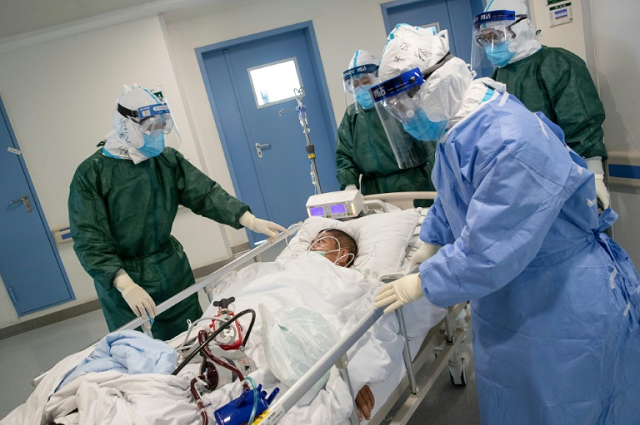One in seven children in Pakistan, 14 per cent, who contract moderate to severe Covid-19 loses their lives to the virus, a mortality rate that is many times higher than countries in the West, according to a World Health Organisation sponsored multi-centre study in Pakistan.
The study was led by faculty from Aga Khan University who partnered with Karachi’s National Institute of Cardiovascular Diseases and National Institute of Child Health; Children’s Hospital, Lahore; and Benazir Bhutto Hospital in Rawalpindi.
Researchers studied over 1,100 children who had tested positive for the virus and had been admitted to the hospital for treatment. Data was collected on newborns, infants, babies and adolescents up to 18 years old between March 2020 and December 2021.
Read more: Pakistan reports first ‘suspected case’ of Omicron variant in Karachi
AKU’s Dr Qalab Abbas, Dr Fyezah Jehan and Dr Shazia Mohsin, the study’s principal investigators in Pakistan, said, “Paediatricians around the country are now suggesting three potentially life-saving changes to treatment guidelines for critically-ill children.”
The medical experts have urged the medical community to update treatment guidelines while treating Covid-19 patient children as the virus is continuously evolving. They added that overall mortality from Covid-19 in children is low compared to adults and it is now clear that coronavirus is not a benign disease in children.
The seminar saw representatives from the Pakistan Paediatric Association recommend the early use of steroids in critically-ill children followed by intravenous immunoglobin. They also noted the need to adopt prone ventilation, where a patient lies on his stomach while being connected to a ventilator, and the use of either a Continuous Positive Airway Pressure Machine (CPAP), or high flow nasal cannula, to treat children with Covid-19 who are suffering from respiratory problems.
Speakers at the seminar said that WHO is yet to recommend vaccinating children under the age of 12. However, they also pointed out that this study’s results add to the body of evidence recommending vaccines for younger children with comorbidities.
“The majority of child deaths in our study took place between the ages of 1 and 9,” said Dr Abbas, Dr Mohsin and Dr Jehan.
Read more: Covid loses steam in Pakistan with pragmatic response, expanding immunisation drive
“As we conduct further analysis from our data and compare it to our partner sites in India, Ethiopia and South Africa, we will be able to provide more specific guidelines on how vaccination policies could be amended.”
The study found that children with underlying health conditions such as malnutrition, cancer or cardiovascular disease were at a higher risk of dying of Covid-19 with findings showing that one in five young patients with comorbidities, or 19.5 per cent, lost their lives. Even children with a previously clean bill of health were at risk with one in eight children in Pakistan dying after contracting the virus.
Similar studies from western countries have found mortality rates among kids from Covid-19 to be under one percent. Speakers at the seminar stated that mortality rates in the study were high due to a number of reasons. Firstly, since participants were recruited from hospitals they were more likely to have moderate to severe forms of Covid-19. Secondly, one third of children in the study had underlying health conditions.
Early findings from the study show the main cause of death from Covid-19 was multi-system inflammatory syndrome, MIS-C. MIS-C typically occurs a few weeks after a child is infected with the virus. It causes vital organs such as the heart, lungs, kidneys, brain, skin, eyes, or gastrointestinal organs to become inflamed. Respiratory ailments were another major cause of deadly complications from the virus. Further insights into all causes of death in the study and the most important factors that enabled children to survive are currently being compiled.
Researchers noted that most deaths in the study occurred in 2021 rather than 2020 which suggests that later strains of the virus may be more deadly compared to the strain at the start of the outbreak in Pakistan.
Read more: Pakistan restricts travel from six African countries, Hong Kong over new Covid variant
The World Health Organisation-sponsored study collected data from over 5,000 children across Pakistan, India, Ethiopia and South Africa.
Dr Faisal Sultan, special assistant to the prime minister on health, was the chief guest at the event. Representatives from the World Health Organization, UNICEF and Expanded Programme for Immunization, Pakistan, also participated in the seminar.



















